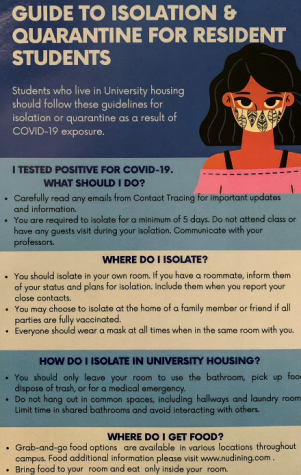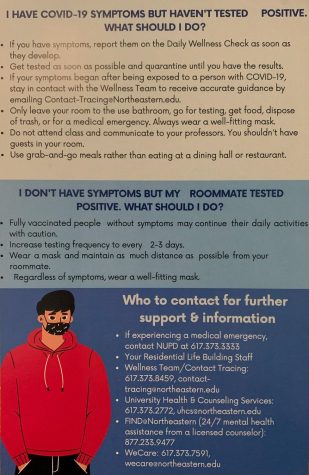A change in guidance
February 1, 2022
One of the biggest changes this semester brought was the closure of wellness housing, which was available for students who tested positive on campus since early in the pandemic.
Henderson announced the university would close wellness housing in an email to students Jan. 13. Unless students are able to arrange for alternative housing, like going home or getting a hotel room, this change means students who test positive for COVID-19 will be isolating in their dorms with their roommates.
In the interview, Henderson explained that emergency housing would be available for students at increased risk, and they can apply for this housing through We Care or Residential Life.
Also included in the new policy changes are shorter quarantine periods consistent with the CDC guidelines and a grab-and-go meal plan for students who test positive.
Henderson explained in the Jan. 13 email that part of the decision to close isolation housing was due to the fact that a majority of the Northeastern community is vaccinated against the virus, which means they will likely experience limited symptoms if any at all.
“The university’s vaccination and booster requirements necessitate a shift in our collective thinking,” Henderson wrote. “While the omicron variant has led to substantial increases in transmission, the most current data demonstrates that the vaccines remain remarkably effective in reducing the risk of severe illness. … The vaccines allow us to begin shifting our mindset and to approach Covid much more like a cold or flu season, which tends to be low-risk for healthy, vaccinated individuals of a college-aged demographic.”

In the interview with The News, Henderson validated student concerns but stressed that the university is shifting its thinking due to the low risk of severe illness.
“The concerns are completely understandable,” he said in the interview. “Really what we’re looking at — and this is not just [on] an individual level, but on the public health scale level — is a mind shift into the place where there will be a risk of infection, but the risk of severe illness is very low. And that is completely understandable, and I empathize with individuals who have concerns about this, but the game has changed with vaccinations and boosters in place and a less severe variant that dominates the infections.”
In a shift from earlier practices, If a Northeastern community member tests positive at the Cabot Testing Center, they will be notified via email, according to the spring 2022 FAQ page. Previously they would receive a call from the Northeastern Wellness Team. After receiving notification of a positive test, they should start their five days of isolation, counting from the date of their positive test or the onset of symptoms, whichever is earlier.
 “Isolation typically lasts for five days followed by five days of wearing a mask when around others (both indoors and outdoors), but the exact duration may extend to 10 days based on the person’s symptoms and the date of their positive test,” reads the Isolation and Quarantine information page.
“Isolation typically lasts for five days followed by five days of wearing a mask when around others (both indoors and outdoors), but the exact duration may extend to 10 days based on the person’s symptoms and the date of their positive test,” reads the Isolation and Quarantine information page.
If a roommate, who is presumed negative, needs to be in the same room for any period of time, everyone should wear a well-fitting mask, according to the page. Grab-and-go food is available in campus dining halls for those in isolation.
According to an informational sheet delivered in dorms, for fully vaccinated students whose roommates test positive, Northeastern says if they don’t have symptoms they can “continue their daily activities with caution.” Those students should also increase testing frequency to every two to three days, wear a mask and maintain as much distance as possible from their roommate.
